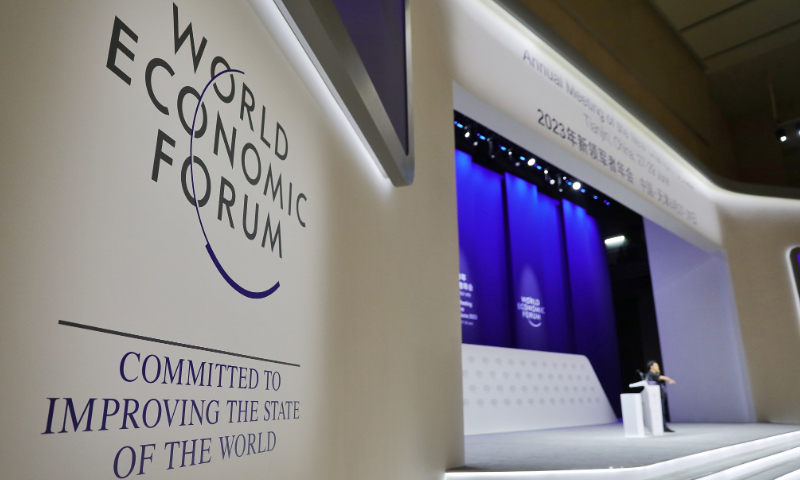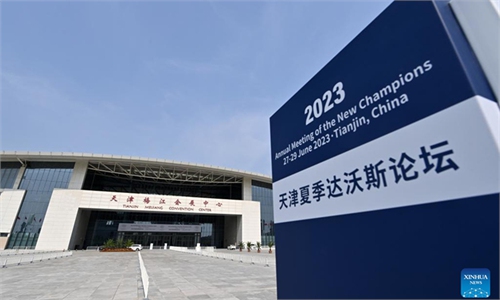
Photo: VCG
China has striven for rapid development in the digital economy during the past 10 years, and in the future it will continue to empower and better serve the real economy to achieve high-quality development, officials and entrepreneurs said during a session at the 14th Annual Meeting of the New Champions, also known as the Summer Davos Forum, in North China's Tianjin Municipality on Wednesday.
According to a report on China's digital economy development released by the China Academy of Information and Communications Technology, the size of China's digital economy exceeded 50 trillion yuan ($6.89 trillion) for the first time in 2022, with nominal growth of 10.3 percent year-on-year, significantly higher than the nominal growth rate of GDP. Also, it accounted for 41.5 percent of the country's GDP.
During the session, Samantha Zhu, chairperson of Accenture in Greater China, said that since 2018, the company, in conjunction with the Ministry of Industry and Information Technology, has published the annual index for Chinese enterprise digital transformation, including the publication of a list of digital transformation "leaders," or leading companies that have achieved solid performance from digital investments.
"Within the last five years, the proportion of eligible companies increased from 7 percent to 17 percent in 2022, a testament to the rapid growth of China's digital economy in recent years," Zhu noted.
Yang Hui, chairman of Yunzhanghu (Tianjin) Sharing Economy Information Consulting Co, told the Global Times that the rapid rise of the digital economy has driven the development of new technologies and industries such as artificial intelligence and big data. New scenarios, new business forms, and new models are developing and being used in all spheres of society and the economy, contributing significantly to the economic recovery in the post-pandemic age.
"Amid the growth of China's digital economy, we provide over 84 million workers in new forms of employment from over 120 countries and regions with flexible employment services. We have increased the efficiency of the industrial chains and developed new consumption chains by applying digital technology to the real economy and to different scenarios such as urban living services," Yang noted.
William Yu, president of Honeywell China, said at the session that Honeywell began building a "digital" factory in Suzhou 20 years ago, but the understanding of "digital" was not yet mature. Over the past two decades, the company has continued to promote the construction of digital factories, eyeing a tenfold increase in production capacity with equal human resources, which has greatly improved production efficiency.
Yu told the Global Times that China's digital economy has grown rapidly over the past few years, leading the world in both the lifestyle and business sectors, and is now increasingly entering the real economy such as the manufacturing industry.
The development of China's digital economy has promoted Honeywell's innovation efficiency. In February this year, the company established a low carbon intelligent building institute to understand the needs of Chinese customers and the market, and bring the development model and practice in China to overseas markets, Yu added.
Looking ahead, Zhu Min, vice-chairman of the China Center for International Economic Exchanges, said that 10 years from now, the digital economy will permeate everything. Artificial intelligence (AI) technologies such as ChatGPT have fundamentally changed the understanding of the digital economy, and the fundamentals of its future development depend on data.
"We can see that AI is stirring up big waves in China and many sectors are very excited about it. The US accounts for 50 percent of the AI big models launched globally and China accounts for 30 percent, but China already has 77 AI big models applied in the production sector," Zhu told the Global Times during the session.
"China's strengths are in its large market, large scale and large data; it is one of the largest data-owning countries in the world," Zhu noted.
Zhang Jiachen, founder and chief executive officer of Guangzhishu Technology, said that in the next decade, digital development will focus on rethinking data infrastructure, including privacy, entitlement, pricing and flow of data.
China established a national data bureau this year, which is responsible for advancing the development of data-related institutions, coordinating the integration, sharing, development and application of data resources, and pushing forward the planning and building of a Digital China, the digital economy and a digital society, among others.


